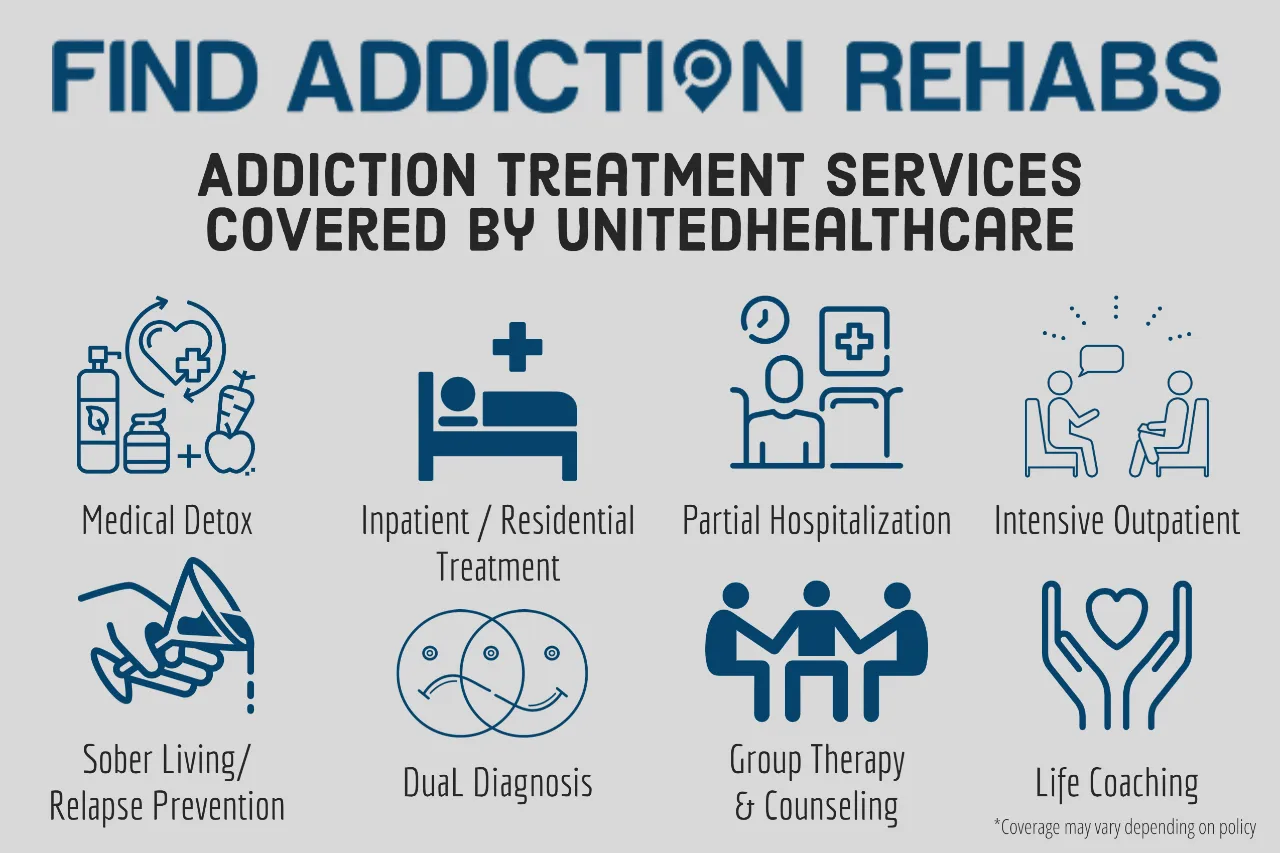Paying for Drug Addiction Treatment With Insurance
Table of Contents
- Paying for Drug Addiction Treatment With Insurance
- Seeking United Health Care Drug Rehab Arizona Services
- Are All Drug Rehab Services Covered By United Health Care?
- Finding the Right Addiction Treatment Center in Arizona
- Get Detox and Drug Rehab Options Using UHC Today!
- FAQs on UnitedHealthcare Coverage for Drug Rehabs in AZ
Drug addiction treatment is often expensive, but there are many ways to pay for it, including insurance. Most health insurance plans, including those offered through the Affordable Care Act (ACA), cover some or all of the cost of addiction treatment, including United Health care Drug Rehab Arizona services.
If you have (UHC) United Healthcare coverage, your plan should include access to mental and behavioral health services, including addiction treatment. Furthermore, as one of the leading healthcare providers in the US, many drug rehab centers in Arizona will accept your United Healthcare insurance policy.
Keep reading to learn more about how your insurance can help you cover the costs of rehab, and how Find Addiction Rehabs can provide confidential support in finding covered treatment options in Arizona among top facilities!
Seeking United Health Care Drug Rehab Arizona Services

Arizona has faced its fair share of issues related to drug and alcohol addiction, which is why this state has made great efforts to increase access to effective and comprehensive substance abuse treatment options.
If you are looking for rehabilitation services in The Grand Canyon State, having a UnitedHealthcare insurance plan can make it much easier to find a treatment facility that is right for you. No matter what service you are looking for, insurance can help make treatment less about cost and more about recovery.
Many drug rehab facilities in Arizona accept United Healthcare plans, making it easier for you to get the help you need, at a price you can afford. Knowing what services are covered under your insurance plan will allow you to choose a treatment facility that is right for your needs.
A quick and confidential call to Find Addiction Rehabs will let you know the coverage details, any out-of-pocket costs, and best of all, align you with facilities matched to your specific needs.
Are All Drug Rehab Services Covered By United Health Care?

Once you have committed to your decision to seek treatment, it is important to first determine what services will be covered by your insurance company. This will make it easier to find a program that is right for your recovery needs and your wallet.
The extent of insurance coverage you may be able to receive will vary depending on your specific plan, but it typically includes detox, inpatient treatment, and outpatient treatment.
Medical Detox Programs
Medical detox is the process of safely removing drugs or alcohol from your body under the supervision of a medical professional. It is an important first step in addiction treatment, as it can help to prevent serious withdrawal symptoms and other complications.
There are many medical detox centers in Arizona that offer a variety of services. Some centers offer inpatient detox, which means that you will stay at the center for the duration of your treatment. Other centers offer outpatient detox, which means that you will go to the center for treatment during the day and return home at night.
This is usually the first step in the drug and alcohol rehab process. Once you have completed detox, you can proceed to either an inpatient or outpatient care setting to receive further treatment and recovery support.
Residential Inpatient Treatment
Residential inpatient treatment is a type of addiction treatment that provides 24-hour care in a structured environment. This type of treatment is often the most effective for people with severe addiction or co-occurring mental health disorders.
Residential inpatient treatment typically includes the following components:
- Detoxification: This is the process of safely removing drugs or alcohol from the body. It is often the first step in residential inpatient treatment.
- Individual therapy: This type of therapy provides one-on-one support and guidance from a therapist. It can help people to understand their addiction and develop coping mechanisms for dealing with cravings and triggers.
- Group therapy: This type of therapy provides support and guidance from a group of people who are also struggling with addiction. It can help people to feel less alone and to learn from the experiences of others.
- Educational classes: These classes provide information about addiction, recovery, and relapse prevention, which will have many benefits for long-term recovery.
- Recreational activities: These activities help people to relax and de-stress. They can also provide opportunities for people to build relationships with others in recovery.
Outpatient Rehab Services

Outpatient rehabilitation is a type of rehabilitation that allows patients to receive therapy on an outpatient basis, meaning they can go home after their treatment sessions. This type of rehabilitation is often less intensive than inpatient care, but it can still be very effective in helping clients recover from their addiction issues.
This type of care may be provided through an intensive outpatient program, partial hospitalization program, or standard outpatient program. Partial hospitalization and intensive outpatient programs can offer more intensive care, while still allowing you to stay flexible with your treatment schedule.
Mental Health Treatment
Dual diagnosis is a term used to describe the co-occurrence of a mental health disorder and a substance use disorder. It is estimated that about 9.2 million adults in the US are suffering from a substance use disorder and a co-occurring mental health disorder.
Dual diagnosis treatment is a type of therapy that addresses both the mental health disorder and the substance use disorder. This type of treatment is often more effective than treating each disorder separately.
There are many different types of dual diagnosis treatment available. Some of the most common types include:
- Individual therapy
- Group therapy
- Family therapy
- Medication management
- 12-step programs
The best type of dual diagnosis treatment for you will depend on your individual needs. If you are struggling with co-occurring disorders, it is important to talk to one of our representatives. We can help find the right treatment for you.
Finding the Right Addiction Treatment Center in Arizona
Whether you are in Tucson, Phoenix, or Scottsdale, AZ, choosing the right addiction treatment center can be a daunting task, but it is an important one. The right center can help you or your loved one get the help they need to overcome addiction and achieve long-term recovery.
- Your specific needs and goals.
- The type of treatment offered.
- The facility’s staff and accreditations.
- The cost of treatment.
- The location of the treatment facility.
Choosing the right addiction treatment center is an important decision, but it does not have to be overwhelming. By considering the factors above and speaking to our recovery representatives, you can find the right center for you or your loved one with confidence.
Get Detox and Drug Rehab Options Using UHC Today!

If you are covered through United Health Care and are struggling with addiction, the Find Addiction Rehabs team is here to help. We can help you find treatment options that are covered by your insurance nationwide.
Improving our lives is not always easy. Achieving sobriety will take hard work and dedication, but with the right support, recovery is possible. With just one phone call, we can help verify your insurance and find treatment programs that can serve all of your needs, without breaking the bank.
The only person who can make the choice to start living a better life is you. So make the right decision, and call now to start your recovery today!
FAQs on UnitedHealthcare Coverage for Drug Rehabs in AZ
What Types of Addiction Will Insurance Cover Treatment For?
The types of addiction that your insurance plan will cover treatment for can vary depending on your specific provider and policy, but most plans will cover treatment for the following:
- Substance use disorders, including addiction to alcohol, prescription drugs, and illegal drugs.
- Behavioral addictions, such as gambling addiction, food addiction, and sex addiction.
- Co-occurring disorders, which are mental health conditions that often coexist with addiction, such as anxiety, depression, and post-traumatic stress disorder (PTSD).
The level of coverage that insurance provides for addiction treatment also varies depending on the plan. Some plans will only cover inpatient treatment, while others will also cover outpatient treatment, partial hospitalization, and intensive outpatient treatment.
Some plans may also cover medications for addiction, such as methadone and Suboxone. We can help you find out exactly what types of addiction treatment are covered under your plan and how much of the cost you will be responsible for.
Can I go to Rehab Without Insurance?
Yes, you can go to rehab without insurance. There are many resources available to help you pay for treatment, including scholarships and grants, sliding scale fees, support from friends and families, and donations received through crowdfunding platforms.
The most important thing is to reach out for help with Find Addiction Rehabs. There are many resources available to you, and you don’t have to go through this alone. We can help you go over all of your payment options and find a rehab program that works with your budget.
Edward lives and works in South Florida and has been a part of its recovery community for many years. With a B.A. in English Literature from the University of Massachusetts, he works to help Find Addiction Rehabs as both a writer and marketer. Edward loves to share his passion for the field through writing about addiction topics, effective treatment for addiction, and behavioral health as a whole. Alongside personal experience, Edward has deep connections to the mental health treatment industry, having worked as a medical office manager for a psychiatric consortium for many years.

